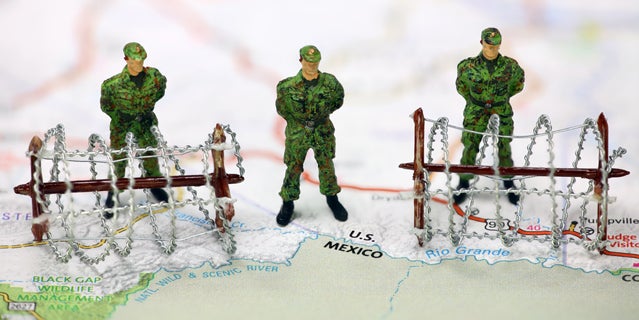
Last month, the House of Representatives passed that would exempt the U.S. Customs and Border Protection (CBP) from more than 10 important environmental laws, including the Wilderness Act, the National Environmental Policy Act and the Endangered Species Act.
The contentious legislation, dubbed the National Security and Federal Lands Protection Act, would essentially prevent the Departments of Agriculture and the Interior from enforcing environmental laws that might “impede, restrict or prohibit” the activities of the Border Patrol on federal land within 100 miles of the southern and northern U.S. borders.
The bill's backers say that the CBP is often hampered or slowed in its efforts to monitor and patrol federal borderlands, specifically along the southwestern border, because it must get clearance for many of those activities. Its opponents, which include high-ranking officials in both the Department of Homeland Security and the Department of the Interior, say the CBP doesn't need such an overarching policy change.
In an interview early this year, National Park Service Director Jonathan Jarvis told ���ϳԹ��� that the NPS has cooperative relations with the border patrol and the Department of Homeland Security. “Now, obviously there are some areas of the border that are greater challenges than others, so I think a case by case and park by park approach is appropriate, and not one size fits all [approach],” he said.
Secretary of Homeland Security Janet Napolitano has even come out against the bill (formerly H.R. 1505) by calling it “.”
The current bill gives the CBP “immediate access” to build roads and fences on federal land within 100 miles of either border. This amounts to 600 million acres of federally-protected land and includes more than 10 national parks. It would allow CBP to build surveillance towers and set up new “operating bases.”
“I think we have to recognize that these borderlands are important wildlife habitat,” Jarvis said back in January. “They are important for conservation in general. They are important for visitors and tourism.”
The Government Accountability Office last year issued a report that showed this sentiment was even shared by some border agents within the Border Patrol. However, , “22 of the 26 patrol agents-in-charge reported that the overall security status of their jurisdiction had not been affected by land management laws. Instead, factors such as the remoteness and ruggedness of the terrain have had the greatest effect on their ability to achieve operational control in these areas.”
OTHER ISSUES
The legislation, H.R. 2578, also includes a raft of other bills, all of which relate to land use and access. Among these are a bill that would lift vehicle restrictions—designed to protect endangered nesting shorebirds and turtles—along North Carolina's Cape Hatteras National Seashore, and one that would allow re-routing of a wilderness road in Washington's North Cascades National Park.
The road in question, the Stehekin Valley Road, was badly damaged by flooding in 2003 and numerous times before then. Rather than attempt to continuously repair it, the bill would allow a new section of road to be built outside the floodplain by swapping the current washed out sections for an equal amount of currently roadless area.
Sean Smith, the 's policy director, says his group opposes the bill because of its cost and impact on wilderness. The Congressional Budget Office estimates the road would cost $3 million to build. “There has not been a detrimental impact on visitation to the park since the upper section of the Stehekin Valley Road washed away,” Smith says.
The road is accessible only by boat or airplane, so it has little vehicular traffic to begin with, since most visitors elect to access the area via passenger ferry. But there are some local tour operators who want to see the road re-routed.
A Senate hearing on the bill has not been scheduled, and time is very tight for its backers to push it through before the end of the current congressional session.
—Mary Catherine O'Connor